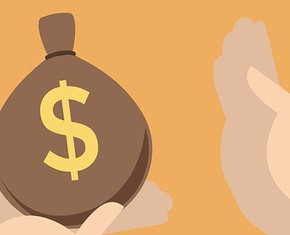The views expressed in our content reflect individual perspectives and do not represent the authoritative views of the Baha'i Faith.
We have a huge, mostly unrecognized problem in the modern era: Large multinational corporations have largely figured out how to avoid paying their taxes.
This corporate avoidance strategy shifts the tax burden to you and me, the individual taxpayers. It also starves public services like infrastructure, education, and healthcare. It levies a massive burden on the middle class. It exerts an unfair level of pressure on the entire society to try to pay for its essential governmental functions and services with insufficient revenues.
RELATED: Debunking the Fairy Tales of Eternal Economic Growth
From a Baha’i perspective, this unjust state of affairs must change. In the mid-1800’s Baha’u’llah, the prophet and founder of the Baha’i Faith, addressed letters and tablets to the kings and rulers of the world, commanding them to desist from overtaxing their populations:
O kings of the earth! We see you increasing every year your expenditures, and laying the burden thereof on your subjects. This, verily, is wholly and grossly unjust. Fear the sighs and tears of this wronged One, and lay not excessive burdens on your peoples.
In those same tablets, Baha’u’llah prescribed the remedy for unjust taxation, militarization, and oppressive nationalism:
O rulers of the earth! Be reconciled among yourselves, that ye may need no more armaments save in a measure to safeguard your territories and dominions. Beware lest ye disregard the counsel of the All-Knowing, the Faithful.
Be united, O kings of the earth, for thereby will the tempest of discord be stilled amongst you, and your peoples find rest, if ye be of them that comprehend. Should any one among you take up arms against another, rise ye all against him, for this is naught but manifest justice.
In the 21st century, however, corporations have accomplished their taxation sleight-of-hand in several different ways: by hiding or deferring their profits; by aggressive lobbying for exemptions and favorable treatment, and by establishing a legal corporate presence — often just a mailbox — in offshore tax havens.
Because those corporations are multi-national, they can choose to place their headquarters or most profitable subsidiaries wherever they want in the world, which means, by definition, that they can pick the places with the lowest taxes and the least enforcement.
Examples abound: the U.S. Institute on Taxation and Economic Policy (ITEP) has reported that:
Most of America’s largest corporations maintain subsidiaries in offshore tax havens. At least 366 companies, or 73 percent of the Fortune 500, operate one or more subsidiaries in tax haven countries.
The ITEP also reports that:
Overall, multinational corporations use tax havens to avoid an estimated $100 billion in federal income taxes each year. Every dollar in taxes that corporations avoid must be balanced by higher taxes on individuals, less public investments and services and more federal debt.
RELATED: The Spiritual Meaning of Wealth
Here’s another example, and it’s one among hundreds: the world’s third-largest corporation, Amazon, paid no U.S. federal taxes in 2018 — even though it made $11 billion in profit that year. In the following year, 2019, Amazon paid only 1.2 percent in federal taxes.
Yet another example: U.S. corporations pay an average of 11% in federal taxes — while individual American taxpayers pay an average of 14%.
Here is the most telling statistic — the world’s average corporate tax rate hovered at around 40 percent in 1980, but fell to about 23 percent by 2020, according to the Tax Foundation. This severe drop has hurt both rich and poor countries.
Clearly, the playing field has tilted far from level. Nations can no longer enforce their tax laws, and many countries have started a “race to the bottom” by lowering their corporate tax rates to attract more companies and increased corporate investment. Powerful, wealthy multinationals have enormous leverage on government tax policies, so this negative trend will likely continue unless we all do something to stop it.
What can be done?
Some of the world’s developed countries have suggested a new idea: to institute, with the general agreement of the community of nations, a universal minimum tax rate for corporations.
Janet Yellen, the Treasury Secretary of the United States and the former Chair of the Federal Reserve Bank, has proposed a global negotiation of tax laws that would set a “floor” rate for corporate taxation. On March 15, 2021, The Washington Post reported that:
Yellen is working to curb the practice [of corporate tax avoidance] through an effort at the Organization for Economic Cooperation and Development in which more than 140 countries are participating. The goal is for countries to agree in principle to a minimum corporate tax rate — although it would be nonbinding — that would make it harder for multinational corporations to play countries off one another by threatening to leave. …
“It’s a little like the Paris climate accord of taxes. Every country thinks it can steal business from others by lowering taxes, and the only beneficiary of that race to the bottom has been the richest multinational corporations,” said Joseph Stiglitz, a Nobel Prize-winning economist at Columbia University and a mentor of Yellen’s.
Yes, this may be a baby step, especially since any agreed-upon minimum corporate tax rate would only be voluntary — but it’s a start. This kind of global treaty between nations, based on the model of the Paris Climate Agreement of 2015, could engender a trend toward a more just, fair, and equitable system of taxation.
However, to regulate, oversee, and fairly tax multinational corporations, we will inevitably need a multinational system of government, just as the Baha’i teachings have long advocated. As Shoghi Effendi, the Guardian of the Baha’i Faith, wrote in his book “The World Order of Baha’u’llah” in the 1930s:
Some form of a world super-state must needs be evolved, in whose favor all the nations of the world will have willingly ceded every claim to make war, certain rights to impose taxation and all rights to maintain armaments, except for purposes of maintaining internal order within their respective dominions.
If we all begin to visualize, ponder, and reflect on the real needs of the world and its peoples — freedom from war, hunger, poverty, and environmental degradation — this global oneness and governmental unity offers humanity its last best hope.
















Comments
Sign in or create an account
Continue with Googleor